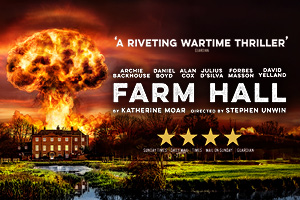Farm Hall at Theatre Royal Haymarket in the West End – review
Stephen Unwin’s production runs until 31 August

The moral and ethical debate around the race to develop the atomic bomb gave Christopher Nolan his Oscar for Oppenheimer. In the same year, it also produced the tiny Jermyn Street Theatre’s biggest hit in Katherine Moar’s rather less bombastic play Farm Hall.
Moar, in her playwriting debut, fixes on a little-known incident in World War Two history when in 1945, after Hitler’s death, the Allies imprisoned six of Germany’s most talented nuclear scientists in a run-down Cambridgeshire mansion called Farm Hall.
The men’s conversations were recorded by the authorities in order to discover how much they knew, and how close Germany was to making a nuclear weapon. But although they were not free, they lived in relative comfort, entertaining themselves – as Moar depicts in the opening scene – with amateur theatrics (a performance of Coward’s Blithe Spirit), board games (though not, to their sadness, Monopoly) and arguments about their own stance on co-operation within the Nazi scientific hierarchy. Then comes news of Hiroshima, which shatters all their complacencies.
It’s a good story, but the play lacks momentum. Its series of short, disjointed scenes would probably have worked better in Jermyn Street’s close confines, where audience and actors share the same space, and you would have felt as if you were sitting on Ceci Calf’s effectively dilapidated set with its peeling wallpaper and battered piano.
In the grandeur of the Theatre Royal Haymarket, it feels lacking in dramatic tension. Interesting though the setup is, there is no real jeopardy. In the first act, the lines between the scientists are drawn. Two were party members, Bagge (Archie Backhouse) reluctantly, driven by poverty, and one Diebner, who is shunned by the others and turned into a portrait of proud unrepentance by Julius D’Silva.
Two – Hahn (Forbes Masson) and Von Laue (David Yelland) – stood against the regime. Then there is Heisenberg (played with ruffled insouciance by Alan Cox), closely followed by his disciple, the posh diplomat’s son Weizäcker (Daniel Boyd). Their grievances are aired, yet each character remains little more than a cipher, and threads of debate and complicity go unexplored.
It is Hahn, who discovered fission, who is most wracked with guilt and a sense of responsibility when Hiroshima happens, yet although Masson endows him with real pain, his agony is quickly subsumed in another scene where he wins the Nobel Prize for chemistry. (An event which happened earlier, in fact). The position of Heisenberg in terms of what he knew and why he did what he did, is one of the great mysteries of history – explored by Michael Frayn in his much more gripping Copenhagen – and yet it is only in a final monologue that it is fully discussed.
For all director Stephen Unwin’s skill at smoothing the action, the play never escapes its fragmented structure; it remains vaguely drawn rather than compelling.
















